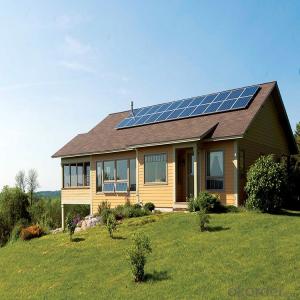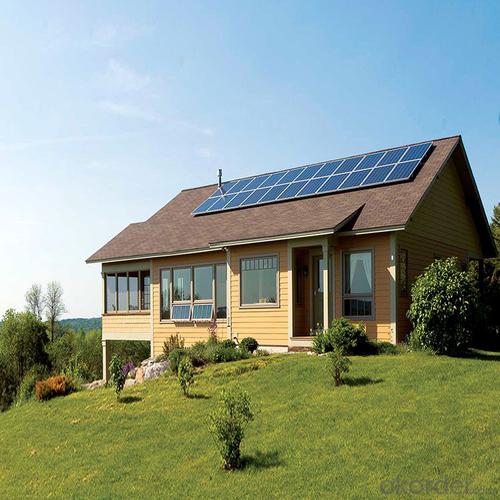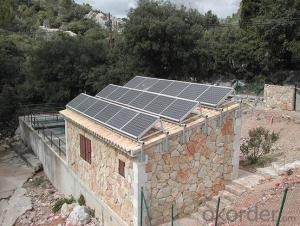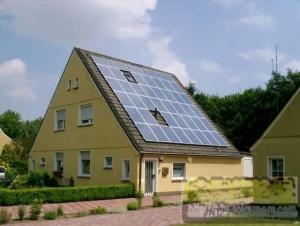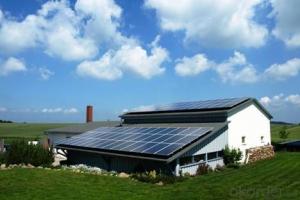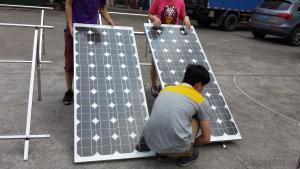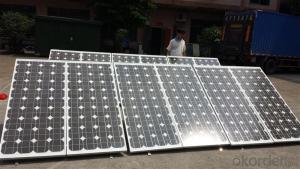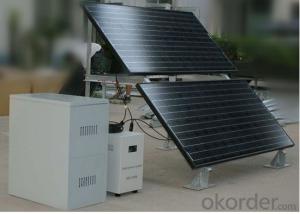Solar Energy Systems NYC:5kw-50kw Solar Roof Mounting Systems, Off Grid Solar Power Systems
- Loading Port:
- Shanghai
- Payment Terms:
- TT OR LC
- Min Order Qty:
- 1 set
- Supply Capability:
- 10000 set/month
OKorder Service Pledge
OKorder Financial Service
You Might Also Like
Specification
Off grid solar power systems is a kind of energy-saving and environmentally friendly system. It is a system uses PV modules to convert sunlight into electricity. It's made up of PV module, controller, battery and inverter. It is mainly used in some remote and power unstable areas. Solar power system is mainly used to drive all kinds of household electrical appliances and office equipment, to solve the power shortage situation without electricity or people living or working electricity problem.
This Solar system not only have solar power system function, but also have Utility complementary function. When main power off , the solar system can switch automatically to take use off solar power from battery to run load, When solar power not enough and power off, it can switch automatically to main power and connect with grid electricity take use of main power .at the same time charging battery.


Off-grid solar power systems can be applied to the villa, household, tourist resorts, prairie areas, remote mountain village, no power supply areas, farms, villages, island, highway and any regions to generate electricity.It can load household appliances like TV, Air Conditioner, refrigerator, lighting, washing machine, etc.

We supply a range of custom designed off-grid solar power systems. The off grid solar system are designed specifically for your project, based on your electricity needs and the location of the building.

- Q: What is the role of solar-powered water heaters in solar energy systems?
- The role of solar-powered water heaters in solar energy systems is to utilize the sun's energy to heat water for various purposes such as domestic use or space heating. By harnessing the sun's energy, these heaters reduce reliance on fossil fuels, decrease carbon emissions, and contribute to a more sustainable and environmentally friendly energy system.
- Q: What is the impact of lightning on solar panels?
- The impact of lightning on solar panels can be significant and potentially damaging. Lightning strikes can cause immediate damage to the solar panels themselves, leading to malfunctions or complete destruction. The intense heat generated by lightning can melt or vaporize the materials used in the solar panels, resulting in irreparable damage. Moreover, lightning strikes can also cause electrical surges that can travel through the solar panel system and damage other connected equipment, such as inverters, charge controllers, or batteries. These power surges can overload and fry the delicate electrical components within the system, rendering them inoperable. To mitigate the impact of lightning, solar panel installations often include surge protectors or lightning arrestors to redirect the high-voltage electrical currents away from the solar panels and other sensitive equipment. These protective measures help to minimize the risk of damage to the solar panel system. However, even with these precautions in place, lightning strikes can still pose a threat to solar panels. Therefore, it is advisable to have a comprehensive insurance policy that covers lightning damage for solar panel installations. Regular maintenance and inspection of the solar panel system can also help identify any potential issues caused by lightning strikes and enable timely repairs. Overall, the impact of lightning on solar panels can be detrimental, leading to immediate damage and potential long-term consequences for the entire solar panel system. Taking precautionary measures, having proper insurance coverage, and monitoring the system's condition are essential to minimize the risk and ensure the longevity of solar panel installations.
- Q: Can I install solar panels myself?
- Yes, you can install solar panels yourself if you have the necessary knowledge, skills, and experience. However, it is highly recommended to consult with professionals or hire a licensed solar installer to ensure safety, compliance with regulations, and optimal performance of the solar panel system.
- Q: Can solar energy systems be used for powering hotels?
- Hotels can definitely use solar energy systems to power their operations. In fact, many hotels worldwide are already utilizing solar power to fulfill their energy requirements. Solar energy systems, such as PV panels or solar thermal systems, can be installed on hotel rooftops or surrounding land to capture the sun's power and convert it into electricity or heat. Solar power offers numerous advantages for hotels. Firstly, it is a clean and sustainable energy source, contributing to reduced carbon footprints and promoting sustainable practices. By utilizing solar energy, hotels can significantly decrease their dependence on fossil fuels and lower greenhouse gas emissions. Secondly, solar energy systems provide hotels with energy independence and reduce reliance on the grid. This is especially beneficial in remote areas or during power outages, as hotels can seamlessly continue operations with their own power supply. Additionally, surplus energy generated by solar panels can be stored in batteries for use during nights or cloudy days. Moreover, installing solar panels can be a wise financial decision for hotels. While initial installation costs may be high, solar energy systems have long lifespans and can result in substantial savings on electricity bills over time. In certain cases, hotels can even sell excess energy back to the grid, generating additional revenue. Lastly, solar power can enhance a hotel's reputation and attract environmentally-conscious guests. Many travelers actively seek eco-friendly accommodation options, and hotels utilizing solar energy can position themselves as sustainable and socially responsible. In conclusion, solar energy systems can certainly power hotels, offering clean, renewable, and cost-effective energy sources. They provide energy independence, financial benefits, and enhance a hotel's reputation. As the world moves towards a more sustainable future, solar power has become an increasingly popular choice for hotels seeking to minimize their environmental impact and efficiently meet their energy needs.
- Q: How much space is needed for a solar energy system installation?
- The space required for a solar energy system installation depends on various factors such as the capacity of the system, the type of panels used, and the available sunlight in the area. On average, for a residential solar system, you would typically need around 100 to 400 square feet of unshaded rooftop space per kilowatt of solar panels. However, it is important to note that solar panels can also be installed in other areas such as ground-mounted systems or as part of building-integrated photovoltaics (BIPV), where solar panels are incorporated into the structure of the building. In such cases, the space requirements can vary significantly depending on the specific design and requirements. Additionally, it is crucial to consider any local regulations or restrictions that may affect the installation. Some areas may have zoning restrictions, setback requirements, or aesthetic considerations that could impact the available space for solar panel installation. Overall, it is recommended to consult with a professional solar installer who can assess your specific needs, evaluate the available space, and provide accurate information on the space requirements for a solar energy system installation in your particular situation.
- Q: Can solar energy systems be used in areas with limited skilled labor?
- Yes, solar energy systems can be used in areas with limited skilled labor. Solar energy systems are designed to be user-friendly and require minimal maintenance. Additionally, there are various training programs and resources available to develop the necessary skills for operating and maintaining solar energy systems. With proper training and support, communities in areas with limited skilled labor can successfully adopt and benefit from solar energy systems.
- Q: Can a solar energy system be used to charge electric vehicles?
- Yes, a solar energy system can be used to charge electric vehicles. Solar panels generate electricity from the sun's rays, and this electricity can be used to charge the batteries of electric vehicles. These solar panels, also known as photovoltaic (PV) panels, capture sunlight and convert it into direct current (DC) electricity. This DC electricity can then be converted into alternating current (AC) electricity using an inverter, which is compatible with the charging requirements of electric vehicles. By connecting the solar energy system to an electric vehicle charging station, the solar-generated electricity can directly charge the vehicle's battery. This renewable energy source not only reduces the reliance on fossil fuels but also helps to decrease greenhouse gas emissions associated with transportation. Furthermore, the excess electricity generated by the solar panel system during daylight hours can be stored in batteries or fed back into the grid for later use, ensuring a continuous and sustainable power supply for charging electric vehicles.
- Q: Can solar energy systems be used for powering off-grid disaster response teams?
- Yes, solar energy systems can be used for powering off-grid disaster response teams. Solar panels can generate electricity from sunlight, providing a reliable and sustainable source of power in areas where the traditional grid is unavailable or disrupted due to a disaster. This enables disaster response teams to operate critical equipment, communication systems, and medical facilities, ensuring effective response and aid delivery in these challenging situations.
- Q: How do solar energy systems reduce carbon emissions?
- Solar energy systems reduce carbon emissions by converting sunlight into electricity or heat without burning any fossil fuels. Unlike traditional energy sources such as coal or natural gas, solar energy does not release any greenhouse gases or pollutants into the atmosphere during operation. This means that using solar energy reduces the dependence on fossil fuels, which are major contributors to carbon emissions and climate change. By harnessing the power of the sun, solar energy systems help to mitigate the environmental impact of energy production and promote a cleaner and more sustainable future.
- Q: Can solar energy systems be used in rural areas without access to the grid?
- Yes, solar energy systems can be used in rural areas without access to the grid. Off-grid solar systems, such as standalone photovoltaic (PV) systems with batteries or solar-powered generators, can provide electricity to rural areas independent of the grid. These systems can be installed in remote locations and harness solar energy to generate electricity, making them a viable and sustainable energy solution for rural communities with limited or no grid access.
Send your message to us
Solar Energy Systems NYC:5kw-50kw Solar Roof Mounting Systems, Off Grid Solar Power Systems
- Loading Port:
- Shanghai
- Payment Terms:
- TT OR LC
- Min Order Qty:
- 1 set
- Supply Capability:
- 10000 set/month
OKorder Service Pledge
OKorder Financial Service
Similar products
Hot products
Hot Searches
Related keywords
